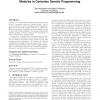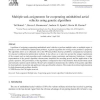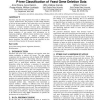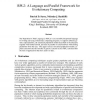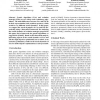376 search results - page 32 / 76 » Non-Linear Genetic Representations |
GECCO
2008
Springer
13 years 8 months ago
2008
Springer
The choice of an appropriate hardware representation model is key to successful evolution of digital circuits. One of the most popular models is cartesian genetic programming, whi...
COR
2006
13 years 7 months ago
2006
A problem of assigning cooperating uninhabited aerial vehicles to perform multiple tasks on multiple targets is posed as a new combinatorial optimization problem. A genetic algori...
SIGKDD
2002
13 years 7 months ago
2002
Genomics data has many properties that make it different from "typical" relational data. The presence of multi-valued attributes as well as the large number of null valu...
PPSN
1994
Springer
13 years 11 months ago
1994
Springer
The Reproductive Plan Language 2 (RPL2) is an extensible interpreted language for writing and using evolutionary computing programs. It supports arbitrary genetic representations,...
CEC
2005
IEEE
14 years 1 months ago
2005
IEEE
Genetic algorithms (GAs) and evolution strategies (ESs) are two widely used evolutionary algorithms. The main differences between GAs and ESs lie in their representations and varia...
